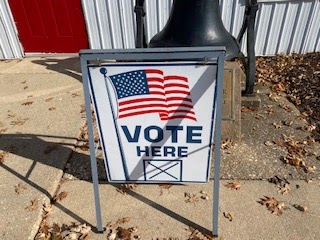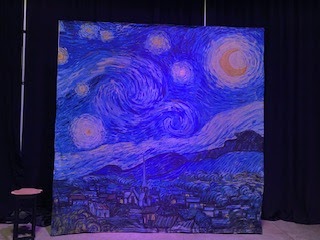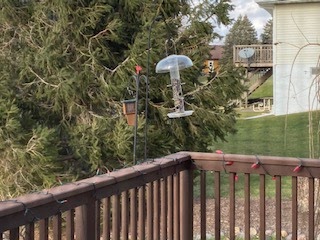Voting: The most important civic duty?
 |
| The entrance to an Election Day voting site in McCausland, Iowa. |
November 8 is Election Day in the United States and, one might argue, one of the most important days of the year.
Midterm elections -- such as in 2022 -- cause a yawn in some quarters. But democracy operates according to the results.
Civic duty? You bet!
The right to vote has expanded over the centuries. The National Geographic Society notes the process of voting is included in Article 1 of the U.S. Constitution. The society's report is a civics lesson published online.
The first voters in the new United States were essentially land-owning white men. They were the "popular vote" which elected men to the U.S. Senate and House of Representatives.
The president is actually chosen by the Electoral College.
The House races are every two years while a Senate term is six years. Presidents are chosen every four years.
According to the National Geographic Society, those who were originally "disenfranchised" included women and minorities. Women won the right to vote in 1920 and the voting rights of minorities were generally addressed in the landmark 1965 Voting Rights Act.
The legal age to vote has changed a few times. It was 21 years old, and then reverted to 18 years old in 1971. My first time to vote was Tuesday, Nov. 2, 1976, at the Cedar County Courthouse in Tipton, Iowa.
When I was a little girl my mother used to talk to me about elections, and actually took me to vote a few times. I hope I behaved! She and my dad were active in Minnesota politics.
I can't remember a time when I didn't know about the importance of voting.
These days, I vote in tiny McCausland, Iowa, the nearest municipality to our home in rural Scott County, Iowa.
I was voter #68 at about 1:15 p.m. on Nov. 8. I filled out the paper ballot with a ballpoint pen carefully as one of my friends ran for public office.
It was actually a very pleasant experience. The voting area, home to the city council of McCausland, is located right next to the fire station. There was hand sanitizer and face masks at the door and 5-6 friendly folks handling the intake process.
We didn't have an after-lunch line but two other voters were on site, and there was a steady stream of residents driving up to vote. There was even a "no contact" voting option in McCausland!
I like to vote on Election Day. Husband Steve prefers to vote by absentee ballot, writing out his choices at the kitchen table.
Think voting just doesn't matter?
Consider 2000, when former Vice President Al Gore lost the closest presidential election in history to his Republican challenger, George Bush. The National Geographic reports that in the end, Gore lost Florida, and the election, by 537 votes.
Iowa U.S. Representative Mariannette Miller-Meeks beat her Democratic challenger, Rita Hart, by just six votes in 2020-21. Miller-Meeks is on the ballot again this year and she's used the "six vote" election win in her campaign advertising. It was one of the closest congressional races in U.S. history.
Voting is one of the most powerful actions an average citizen can take.




Comments
Post a Comment